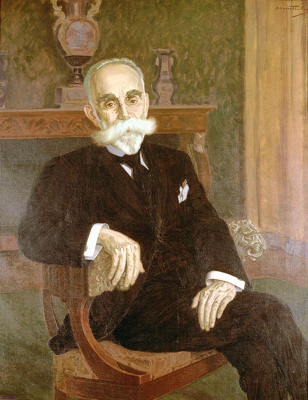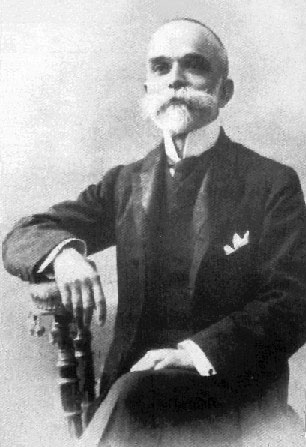<Back to Index>
- 3rd and 8th President of Portugal Bernardino Luís Machado Guimarães, 2nd Baron de Vila Nova de Famalicao, 1851
PAGE SPONSOR


Bernardino Luís Machado Guimarães, 2nd Baron de Vila Nova de Famalicao, GCTE, GCL (Rio de Janeiro, Brazil, 28 March 1851 – Porto, Portugal, 29 April 1944), was a famous Portuguese political figure, the third and eighth President of Portugal (1915 – 17, 1925 – 26).
He was the son of António Luís Machado Guimarães, 1st Baron de Joane and a Nobleman of the Royal Household, a rich merchant raised to the Nobility, and his second wife Praxedes de Sousa Guimarães. He came to Portugal in 1860, enrolled at Coimbra University in 1866, studied Mathematics for three years, and graduated in Philosophy in 1873. In 1872, he chose to obtain Portuguese nationality. Continuing with his studies, he obtained a doctorate in Philosophy in 1876, and graduated in General Agriculture and Rural Economy in 1883. He lectured at that institution since 1877.
In Porto in January 1882 he married Elisa Dantas Gonçalves Pereira (Rio de Janeiro, Rio de Janeiro, 15 December 1865 – 21 April 1942), by whom he had sixteen children. One of his sons in law was writer Aquilino Ribeiro.
He then turned to a second interest; in 1882 was elected to the Portuguese parliament for Lamego, and in 1886 for Coimbra. In 1890 and 1894 was also elected Peer of the Realm by the Coimbra University. During this period he was briefly Minister for Public Works on the Hintze Ribeiro cabinet, in 1893 and created the first labor court in Portugal. Taking a special interest in public education during his political activity he was made part of the Superior Council of Public Education in 1892, and published several books on the subject.
Machado was also briefly President of the Directory of the Democratic Party in 1902, and after switching to the Republican Party, was this party's President of the Directory from 1906 to 1909. He was one of the few monarchists - turned - republican who switched still during the monarchy.
Once the Republic was proclaimed in 1910 he was made Minister for Foreign Affairs, and ran an unsuccessful campaign for the Presidential elections of 1911. Afterwards appointed ambassador to Brazil, made his political comeback in 1914 to lead one of many brief cabinets the country had in this period. Machado ran again to the Presidency in 1915 and was this time elected President of Portugal. In the course of his term, he received Germany's declaration of war (March, 1916), and visited the Portuguese forces placed in France in the battlefields.
In 1917 the government was deposed by a military coup headed by Sidónio Pais, and Machado went into exile.
Upon Machado's return in 1919 he was elected Senator. He served as Prime Minister from 10 February to 23 May 1921. Once again, in 1925, he achieved the presidential office after President Teixeira Gomes resigned, only to be overthrown a year later (1926) by Gomes da Costa (See: 28 May 1926 coup d'état and Ditadura Nacional). The country remained under a military, then civilian, dictatorship until 1974.
For a second time he went into exile in France, where he continued to be very critical of the Portuguese regime. The German occupation of France in 1940 forced him to seek protection in Portugal, which the government granted him with the condition that he was to be confined to his personal retreat in the northern part of Portugal. It was there in Oporto that he died in 1944.
He was father - in - law of the famous writer Aquilino Ribeiro.
He was great - grandfather of the psychologist and sexologist Julio Machado Vaz.